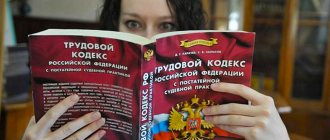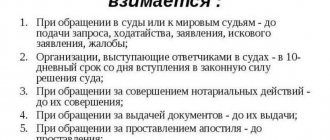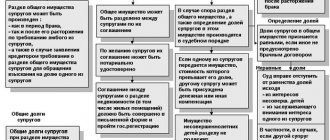Law, theory and concept of law
1 . Marriage is a monogamous, voluntary and equal union of a man and a woman, concluded in compliance with the procedure established by law and giving rise between spouses mutual personal and property rights, as well as responsibilities for raising children and mutual support for each other. 2. Marriage is a legal concept. One of the basic principles of family law is that in Russia a marriage is recognized only in the civil registry office (registry office). State registration of marriage is state recognition of the union of a man and a woman in the registry office through the preparation of an appropriate entry in the civil status act, on the basis of which a marriage certificate is issued. State registration of marriage: is the only form of marriage recognized by the state . Marriages concluded in another way (according to religious, national or other rituals)'. not recognized by the state; have no legal significance; . do not give rise to legal consequences;
• gives rise to mutual personal and property rights and obligations of spouses; §/ provides citizens with the status of subjects of family law. 3* State registration of marriage is carried out the civil registry office ( registry office ) . These bodies are created by state authorities of the constituent entities of the Russian Federation on the basis of Federal Law dated November 15, 1997 No. 143-FZ “On Acts of Civil Status” (as amended on December 8, 2003). The registry office bodies perform the following functions: monitor compliance with the procedure and conditions for concluding marriage; register the emergence of a union between spouses based on their need to create a family; organize records of marriages.
State registration of marriages between citizens of the Russian Federation living outside the territory of the Russian Federation is carried out: in diplomatic missions of the Russian Federation; consular offices of the Russian Federation; competent authorities of foreign states in compliance with the legislation of the country where the marriage was concluded, if there are no circumstances preventing its conclusion (according to Article 14 of the Family Code).
Marriage registration is carried out in any registry office in the territory of the Russian Federation at the choice of the persons entering into marriage . The basis for marriage is a joint application of the persons entering In this case, a day is set for the marriage registration ceremony. If anyone entering into marriage is unable to appear at the registry office to submit an application, the basis for marriage will be the submission of separate applications by one of the persons entering into marriage, and the signature of the absent applicant must be notarized. Marriage registration is carried out only in the personal presence of the persons entering into marriage , i.e. registration of marriage in the absence of one of the parties is unacceptable . The marriage is concluded after a month from the date of submission of the application to registry office by the persons entering into marriage . Establishing a one-month period for registering a marriage has the following goals: to give those entering into marriage a certain time to check the seriousness of their intentions to become husband and wife; provide an opportunity for any interested persons to declare the presence of obstacles to registering a marriage between specific persons; give time to the registry office to verify the accuracy of the applicants’ information.
In the theory of family law, this period is called suspensive and has the following purposes: it is a period for reflection; allows us to identify obstacles to marriage.
The registry office has the right, if there are valid reasons: to reduce the established monthly period for marriage; increase it, but not more than a month.
The following circumstances may be considered valid reasons for shortening the period: pregnancy of the bride; birth of a child; the groom's conscription for military service; urgent departure on a business trip and any similar reasons.
The grounds for reducing the monthly period for marriage are: a joint statement of the persons getting married themselves; documents confirming the existence of extenuating circumstances; certificates from medical institutions about pregnancy, birth of a child, illness, etc.; travel certificate; summons for military service, etc.
Good reasons for extending the term of marriage may include: the person entering into marriage being hospitalized due to a serious illness; going on a business trip; need to check for obstacle messages
for marriage and other circumstances. If the registry office increases the established period from the date of filing the application to the day of state registration, no more than 2 months should pass. The marriage is registered . on a predetermined day; in the premises of the registry office; in a solemn atmosphere;
• by making a record in the registry office about the entry into marriage of persons and a solemn farewell message. After the marriage ceremony is completed, the spouses are given a marriage certificate . During state registration of marriage, spouses are given the right to choose a surname : • common surname: husband’s surname (most often); wife's surname (much less often); a double surname consisting of the surnames of the husband and wife, written with a hyphen, provided that the surname should not contain more than two elements; premarital surname of each spouse.
“Future spouses have the right to go to court in case of refusal by the registry office: from state registration of marriage; in reducing or increasing the waiting period for state registration of marriage if there are valid reasons; from the state registration of marriage on the day of filing the application in the presence of special circumstances.
Last news
18.12.2014
On December 11, the Government of the Novgorod Region hosted a Statehood Lesson for schoolchildren in the region. The event was held by the Commissioner for Human Rights in the Novgorod Region, Galina Matveeva, and the head of the department of education and youth policy of the region, Anatoly Osipov.
It should be noted that as part of the Statehood Lesson, a competition “Family Law in the Russian Federation in Questions and Answers” was announced for students. The authors of the best questions received encouragement from the Commissioner for Human Rights, the Russian Red Cross NROOO and the Star Port charity fund for helping minors and pensioners.
The Department of Education and Youth Policy publishes Anatoly Osipov’s answers to the guys’ questions.
1.How does the law protect the rights of adoptive parents and adopted children?
Answer: The secrecy of the adoption of a child is protected by law. All persons who took part in the adoption procedure or are aware of the adoption are obliged to maintain the secret of the adoption of a child. Persons who divulge the secret of the adoption of a child against the will of his adoptive parents are held accountable in the manner prescribed by law.
4. Isn’t it time to establish Father’s Day in Russia?
Answer: Father's Day in Russia does not yet have official status. At the same time, it is known that on June 15, 2014, this day was celebrated in many regions, including the Novgorod region.
I believe that recognizing Father’s Day as a national holiday will emphasize the value of the family and the indispensability of the father in raising children.
18. Nowadays there is a lot of talk about the problems of families abroad: children are taken away from their parents and sent to live in foster families. Do you think this practice has come to Russia? How to solve this problem?
Answer: Russian family law provides for the removal of a child from its parents. However, these actions are used only when there is an immediate threat to the child’s life or health.
Since 2013, the federal project “Every child is important to Russia” has been implemented, the main goal of which is to preserve and support the family, prevent social orphanhood, and not separate children from their parents.
21. How to solve the problem of a large number of orphans?
Answer: The main goal of demographic policy in Russia is the realization of the right of every child to live and be raised in a family, therefore it is important to unite the efforts of society and the state to resolve issues of strengthening the authority and supporting the institution of the family and family values.
40. At what age can children be adopted?
Answer: According to family law, adoptive parents can be persons who have reached the age of majority.
41. What difference should there be between an unmarried adoptive parent and an adopted child?
Answer: The age difference between the unmarried adoptive parent and the child being adopted must, as a rule, be at least sixteen years. However, for reasons recognized by the court as valid, the age difference may be reduced.
There is no requirement for an age difference when a child is adopted by a stepfather (stepmother).
45. It is a widely known fact that in modern Russia there is a steady tendency to reduce orphanages and to transfer children whose parents are deprived of parental rights to families. I will not dwell on whether every family deserves this. Article 54 of the Family Code states that “every child has the right to live and be raised in a family.” But I am wondering: is there any legal connection between a child who has reached 18 years of age and a guardian? Does the guardian of such a grown child bear any responsibility to him or her, or is the child “thrown overboard from this family”?
Answer: In accordance with the Civil Code of the Russian Federation, guardianship (trusteeship) is established over minor children and is terminated without a special decision when the minor ward reaches eighteen years of age, as well as upon his marriage and in other cases of his acquiring full legal capacity before reaching adulthood.
These questions were answered by Elena Poderskaya, head of the Civil Registry Office department of Veliky Novgorod of the Civil Registry Office and OODMS Committee of the Novgorod Region:
Question 3. Nowhere have we come across a legal definition of family. What does Russian legislation mean by family? (Okulovka, Timirev Vladimir, Ivanova Nadezhda).
The concept of family follows from the norms of the Family Code of the Russian Federation.
A family is usually understood as an association of persons based on marriage or kinship, connected by personal and property rights and obligations, moral and material community, mutual support, raising children, and running a common household.
Question 17. In modern society, civil marriages are becoming increasingly popular. Couples live in a civil marriage, not wanting to officially register their family union. Why do couples do this? Are they afraid of the legal responsibilities that come with marriage? Are there any advantages to legally registered marriages? Is it possible to attract modern couples to enter into such a marriage, rather than live in a civil marriage? (MAOU “Gymnasium”, Valdai, Maria Verderevskaya)
In accordance with Article 1 of the Family Code of the Russian Federation, marriages concluded only in the civil registry office are recognized. Those. marriages concluded in a different way (according to religious, church and other rites) are not recognized, i.e. have no legal force and do not give rise to any rights or obligations. The actual cohabitation of a man and a woman without state registration of marriage in the registry office, so-called “civil” marriages, is not recognized as marriage, no matter how long these relationships may be.
Family law is applicable only to officially registered marriages, which means that only an official marriage is under the protection of the state, which is enshrined in Article 1 of the Family Code of the Russian Federation: “Family, motherhood, paternity and childhood in the Russian Federation are under the protection of the state.”
The basic principles of family law speak of the need to strengthen the family, build family relationships on feelings of mutual love and respect, mutual assistance and responsibility to the family of all its members, the inadmissibility of arbitrary interference by anyone in family affairs, ensuring the unhindered exercise by family members of their rights, the possibility of judicial protection of these rights.
Of course, in connection with marriage, spouses have not only rights, but also responsibilities. Spouses enter into personal non-property and property relations between themselves and their children. An example of such relationships is the relationship between spouses regarding the choice of occupation, profession, place of residence - in these matters, each spouse is free to choose. Issues of motherhood and paternity, upbringing and education of children, spending of the spouses' common funds, ownership, use and disposal of common property - these and other family issues must now be resolved by the spouses jointly based on the principle of equality of spouses. Spouses have the responsibility to build their relationships in the family on the basis of mutual respect and mutual assistance, to take care of the well-being and development of their children.
Question 27. If a married surrogate mother decides to keep the child, then according to the RF IC, the child is registered in her and her husband’s name. But according to the RF IC, the husband’s consent to his wife’s surrogacy is not asked. Is there a violation of the husband’s rights here?” (MAOU secondary school Volot, Ivanova Daria, Stepanova Valeria)
On January 1, 2012, the Federal Law “On the Fundamentals of Protecting the Health of Citizens of the Russian Federation” came into force in Russia. Paragraph 10 of Article 55 of this law gives the following definition:
“A surrogate mother can be a woman aged from twenty to thirty-five years, who has at least one healthy child of her own, who has received a medical certificate of satisfactory health, and who has given written informed voluntary consent to medical intervention. A woman who is married, registered in the manner established by the legislation of the Russian Federation, can be a surrogate mother only with the written consent of the spouse .”
Question 32. Is marriage in absentia allowed? (MAOUSOSH village Poddorye, Matveeva Svetlana)
In accordance with Article 11 of the Family Code of the Russian Federation, state registration of marriage is carried out in the personal presence of persons entering into marriage after a month from the date of filing the application. Both future spouses must appear at the registry office in person. The possibility of marriage through a representative is excluded.
In accordance with Article 27 of Federal Law No. 143-FZ of November 15, 1997 “On Civil Status Acts,” in the event that persons entering into marriage (one of the persons) cannot appear at the civil registry office due to serious illness or other valid reason , state registration of marriage can be carried out at home, in a medical or other organization in the presence of persons entering into marriage.
State registration of marriage with a person in custody or serving a sentence in prison is carried out in the premises determined by the head of the relevant institution in agreement with the head of the civil registry office.
Question 38. When is the age of marriage established in the Russian Federation as a general rule? (MAOU Secondary School Lyubitino, Alekseeva Kristina)
The first and mandatory condition for marriage, enshrined in Article 12 of the Family Code of the Russian Federation, is the mutual voluntary consent of the man and woman entering into marriage and their reaching marriageable age.
Article 13 of the Family Code of the Russian Federation sets the age of marriage in our country at 18 years. If there are valid reasons, local government bodies at the place of residence of persons wishing to get married have the right, at the request of these persons, to allow marriage upon reaching 16 years of age.
The procedure and conditions under which marriage, as an exception, taking into account special circumstances, may be permitted before reaching the age of 16 years, may be established by the laws of the constituent entities of the Russian Federation.
In the Novgorod region, a corresponding regional law has been adopted, allowing persons over 14 years of age to marry due to special circumstances in exceptional cases.
What are these special circumstances?
The bride's pregnancy, the birth of a child, a threat to life, the groom's conscription for military service, etc.
For example, in 2011, out of 2,665 marriages concluded by the Civil Registry Office of Veliky Novgorod, only 9 marriages were registered with the participation of minors (one bride was 14 years old, in other cases the age of brides and grooms was 16-17 years), in 2012 - only 2 marriages (in both cases, those entering into marriage were a little over 17 years old) out of a total of 2533, in 2013 - 8 marriages (brides aged 16-17 years) out of 2451, in 2014 - 8 (only one bride was 15 years old).
Why is the age of marriage not the same in all countries? (MAOUSOSH village Poddorye, Matveeva Svetlana)
Indeed, the minimum age for marriage varies across the world.
For example, in France, a woman can get married at the age of 15, and a man only at the age of 18. In Italy, the law is more loyal to young lovers and allows women to marry from 14 years old, and men from 16 years old. In Germany, the marriageable age for women is 16 years old, and for men it is 21 years old. In the USA, each state has its own laws. Girls can get married at 14-15 years old, and boys - from 18 to 21 years old. In England, the minimum age for newlyweds is the same - 16 years.
In each state, the age of marriage is established by its own family law.
Question 35. Does Russian family law sufficiently protect the interests of persons married before reaching the age of majority? (MAOU Secondary School No. 2, Malaya Vishera, Zagorodnyaya Anastasia)
In accordance with the Civil Code of the Russian Federation, the marriage of a citizen before he reaches the age of eighteen entails the acquisition of civil capacity in full from the date of state registration of the marriage. Moreover, it remains in full even in the event of divorce before reaching adulthood. However, if a marriage is declared invalid, the court may decide that the minor spouse loses full legal capacity from the moment determined by the court.
Thus, minor spouses exercise their rights and fulfill their duties in full on an equal basis with everyone else.
Question 44. I really like beautiful wedding ceremonies abroad. Is it possible for Russian citizens to perform a ceremony outside of Russia and will this marriage be recognized in our country? (MAOU Secondary School Lyubitino, Alekseeva Kristina)
In accordance with Article 158 of the Family Code of the Russian Federation, marriages between citizens of the Russian Federation and marriages between citizens of the Russian Federation and foreign citizens or stateless persons, concluded outside the territory of the Russian Federation in compliance with the legislation of the state in whose territory they were concluded, are recognized as valid in the Russian Federation, if there are no circumstances provided for in Article 14 of the Family Code of the Russian Federation that prevent marriage.
In accordance with this article, marriage cannot be concluded between:
persons of whom at least one is already in another registered marriage;
close relatives (parents and children, grandparents and grandchildren, full and half (having a common father or mother) brothers and sisters;
adoptive parents and adopted children;
persons of whom at least one person has been declared incompetent by a court due to a mental disorder.
In order to have a beautiful, unusual and memorable wedding ceremony, it is absolutely not necessary to travel abroad.
In accordance with the adopted decree of the Administration of the Novgorod Region “On measures to organize activities for state registration of marriage in a solemn ceremony”, since 2009, state registration of marriage in the territory of the Novgorod region, at the request of citizens, can be carried out in the premises of historical and cultural institutions of the Novgorod region, which are objects cultural heritage.
For example, in Veliky Novgorod, on-site ceremonial marriage registrations are held:
- in the front hall of the building of the Noble Assembly - a favorite place of entertainment and recreation for the Novgorod nobility in the 19th century. Today the halls of the Museum of Fine Arts are located here. The ceremonial registration of marriage is carried out among unique exhibits, magnificent paintings by famous artists: Aivazovsky, Bryullov, Bogolyubov. The main unique marble staircase has been preserved, on which exquisite photo sessions are organized with the newlyweds. The entire interior of the building creates a romantic mood and, of course, the event remains in the memory of the newlyweds and guests of the celebration for a long time;
- in the columned hall of the regional philharmonic, which is located in the heart of Veliky Novgorod - the Kremlin. This is the building of the Diocesan House - one of the most beautiful ceremonial buildings, which was the center of spiritual culture of the provincial Novgorod of the early 20th century. Today the regional philharmonic society is a center of secular culture, where famous cultural and artistic figures perform and special events take place;
- in the summer - on Yaroslav's Court - in one of the most picturesque places in Veliky Novgorod - on the banks of the gray Volkhov.
This is a piece of Ancient Rus', an island preserved from that legendary time when the Novgorod trade was noisy here, a veche gathered, the palace of Prince Yaroslav the Wise was located, where the snow-white arches of the Gostiny Dvor embrace the monuments of Yaroslav's Court, among which the 12th century temple - the Church of St. Paraskeva Friday - the patroness family happiness. And today young people are cementing their union, where the bride and groom, according to Novgorod traditions, were called prince and princess, and where, perhaps, the epic Sadko, who amused the people of Novgorod, saw his Lyubava.
Every year the popularity of outdoor wedding ceremonies is growing. If in 2009 there were 13 on-site marriage registrations in Veliky Novgorod, then in 2014 there were already 172.
Question 48. Can citizens of another state get married on the territory of the Russian Federation and what requirements will be met for them? (MAOU Secondary School Batetsky, Andreeva Svetlana)
Yes, foreign citizens have the right to get married on the territory of the Russian Federation.
In accordance with Article 156 of the Family Code of the Russian Federation, the form and procedure for concluding marriage on the territory of the Russian Federation are determined by the legislation of the Russian Federation.
The conditions for concluding a marriage on the territory of the Russian Federation are determined for each of the persons entering into marriage by the legislation of the state of which the person is a citizen at the time of marriage, in compliance with the requirements of Article 14 of the Family Code of the Russian Federation.
In accordance with this article, marriage cannot be concluded between:
persons of whom at least one is already in another registered marriage;
close relatives (parents and children, grandparents and grandchildren, full and half (having a common father or mother) brothers and sisters;
adoptive parents and adopted children;
persons of whom at least one person has been declared incompetent by a court due to a mental disorder.
On average, in Veliky Novgorod annually, out of 2,500 registered marriages, about 70 marriage unions were concluded with the participation of foreign citizens.
Experts from the Novgorod Regional Court answer:
Question 2. Have there been cases in the judicial practice of the Novgorod region when, during the trial, responsibility for disclosing the secret of adoption was assigned?
Answer: In the practice of the courts of the Novgorod region, there were no cases of prosecution for disclosing the secret of adoption.
Question 8. The legislation of the Russian Federation, namely, the Family Code (Chapter 5, Article 27, paragraph 1), talks about the invalidity of marriage. “A marriage is declared invalid... in the event of a fictitious marriage, that is, if the spouses or one of them registered the marriage without the intention of starting a family.” Thus, the question arises: how to recognize a fictitious marriage, and what consequences should follow for concluding it?
The State Duma of the Russian Federation is considering a bill “On amendments to the Federal Law “On the Legal Status of Foreign Citizens in the Russian Federation” in order to prevent the conclusion of fictitious marriages in order to obtain documents for the right of permanent or temporary residence of foreign citizens and stateless persons in the Russian Federation.” The essence of this bill is to identify prisoners and prevent fictitious marriages between foreign citizens and stateless persons with citizens of the Russian Federation. This bill does not imply a more thorough study of the family’s lifestyle and behavior to detect fictitiousness and is dictated by a special attitude towards persons who do not have Russian citizenship.
But, in my opinion, this regulation is not enough. Turning to the experience of the European Union countries, I would like to highlight, for example, Germany and Belgium. In Germany, the police may well check the “authenticity” of a marriage by examining personal belongings and family photographs. In Belgium, there are criminal penalties for entering into a fictitious marriage. To obtain a fiancée visa to the EU countries, you must undergo an interview, during which you will have to answer a number of tricky questions concerning the most personal topics. These methods of regulation, in my opinion, have the right to exist in a legal state, which is also the Russian Federation.
The essence of my question is to understand: is Russian legislation capable of more complicated forms of defining fictitious marriages and more stringent methods of punishment for their conclusion? And if the answer is positive, then, in your opinion, what could be a legislative initiative, other than the one already given as an example, and is it acceptable to use methods that are used in Western countries in the Russian Federation?
Answer: The question is interesting in itself, because... demonstrates the level of preparation of the author.
At the same time, the answer to it implies criminological research, including a statistical, analytical assessment of the phenomenon, determination of the degree of social danger of the act, because the content of social danger is transformed in different periods of social development.
The legislative process also includes the stage of legislative initiative.
Forms of response to a social phenomenon can be different and use measures of administrative, civil, criminal influence. Here, absolutely, the word is up to the legislator.
Question 10. I know how to establish paternity. How can paternity be deprived?
Answer: According to the provisions of Article 69 of the RF IC, deprivation of parental rights, including the father, is possible only in court and only in relation to the person recorded as the child’s father in the child’s birth certificate.
Parents (one of them) may be deprived of parental rights if they:
evade the fulfillment of parental responsibilities, including malicious evasion of child support payments;
refuse, without good reason, to take their child from a maternity hospital (ward) or from another medical organization, educational institution, social welfare institution or similar organizations;
abuse their parental rights;
children are cruelly treated, including physical or mental violence against them, and attacks on their sexual integrity;
are patients with chronic alcoholism or drug addiction;
committed an intentional crime against the life or health of their children or against the life or health of their spouse.
Question 11. What are the conditions and procedure for collecting alimony arrears?
Answer: In accordance with Article 113 of the RF IC, termination of alimony withholding due to the child reaching the age of 18 or for other reasons is not a basis for refusal to collect accumulated alimony debt.
Collection of alimony and arrears thereof is carried out primarily from the earnings and (or) other income of the person obligated to pay alimony.
A writ of execution for the collection of alimony as a type of periodic payments can be sent to an organization or other person paying the debtor wages, pensions, scholarships and other periodic payments, directly by the collector.
If the earnings and (or) other income of the alimony payer are insufficient, alimony and arrears are withheld in the second place from the payer’s funds in accounts with banks (other credit institutions).
Thirdly, alimony is collected from funds transferred under civil contracts to commercial and non-profit organizations, if these contracts do not entail a transfer of ownership.
And finally, if all of the above funds are insufficient, collection of alimony payments is made from any property of the alimony payer, which, by law, can be seized at the request of the creditor.
If the debtor has arrears of alimony, which cannot be repaid within a reasonable time by foreclosure on the debtor's wages due to his lack of a permanent place of work, the bailiff takes measures to foreclose on the debtor's property.
Question 12. How is a marriage dissolved in a special manner?
Answer: The current legislation does not provide for any special procedure for divorce.
Divorce is possible either non-judicially, i.e. in the civil registration authorities (Article 19 of the RF IC), or in court (Article 21 of the RF IC).
Divorce in the civil registry office is carried out only in cases specified by the Family Code of the Russian Federation:
with mutual consent to dissolve the marriage of spouses who do not have common minor children;
at the request of one of the spouses, regardless of whether the spouses have common minor children, in cases where the other spouse is recognized by the court as missing, declared incompetent by the court, or sentenced to imprisonment for a term of over three years for committing a crime.
Divorce and the issuance of a divorce certificate are carried out by the civil registry office after a month from the date of filing the application for divorce
In court, divorce is carried out if the spouses have common minor children or in the absence of the consent of one of the spouses to dissolve the marriage, as well as in cases where one of the spouses, despite the lack of objections, evades divorce in the civil registry office state (refuses to submit an application, does not want to appear for state registration of divorce, etc.).
If there is mutual consent of the spouses to dissolve the marriage, the court dissolves the marriage without clarifying the reasons for the divorce. In this case, the divorce is carried out by the court no earlier than one month from the date the spouses filed an application for divorce. If one of the spouses does not consent to divorce, the court takes measures to preserve the family - a period is given for reconciliation of the spouses within 3 months.
Question 13: When can a marriage be considered invalid?
Answer: In accordance with Article 27 of the Family Code of the Russian Federation, a marriage entered into in violation of the conditions and/or in spite of the obstacles provided for in Articles 12-14 and paragraph 3 of Article 15 of the Family Code of the Russian Federation, as well as a marriage entered into without the intention of the spouses or one of them to start a family (fictitious marriage).
A marriage can only be declared invalid by a court.
A marriage can be declared invalid on the following grounds:
a) lack of voluntary consent of a man and woman entering into marriage (Article 12 of the RF IC):
b) failure of married persons (or one of them) to reach marriageable age, if it has not been reduced in the manner prescribed by law (Articles 12.13 of the RF IC);
c) the married persons (or one of them) have another undissolved marriage (Article 14 of the RF IC);
d) marriage between close relatives (Article 14 of the RF IC);
e) marriage between an adoptive parent and an adopted child (Article 14 of the RF IC);
f) marriage between persons, at least one of whom has been declared incompetent by the court due to a mental disorder (Article 14 of the RF IC);
g) concealment by one of the persons entering into marriage of a sexually transmitted disease or HIV infection (Clause 3 of Article 15 of the RF IC);
h) entering into a fictitious marriage, i.e. if the spouses or one of them registered a marriage without the intention of starting a family.
To declare a marriage invalid, confirmation in court of one of the listed grounds is sufficient.
There are no other grounds for declaring a marriage invalid (the list is exhaustive). Therefore, any other circumstances (for example, silence by one of those entering into marriage about the presence of children or the inability to have them for health reasons, concealment of other diseases) or violations of the requirements established by law for the procedure for concluding a marriage (for example, registering a marriage before the expiration of a month period from the date of submission of the application to the registry office, if this period has not been reduced in the manner provided for in paragraph 1 of Article 11 of the RF IC) cannot be considered as grounds entailing the recognition of a marriage as invalid. In such cases, it is only possible to raise the issue of ending the marriage on the initiative of the spouse (spouses).
Question 14. What allows a person to be released from paying arrears of alimony?
Answer: The grounds and procedure for exemption from payment of arrears of alimony are established by Art. 114 RF IC.
In accordance with paragraph 1 of Article 114 of the RF IC, if alimony was paid by agreement of the parties, the payer and recipient of alimony have the right, by mutual agreement, to resolve the issue of exemption from payment of alimony debt or reduction of this debt. At the same time, the conclusion between the parties of an agreement on exemption from payment of alimony arrears or the reduction of this arrears when paid by agreement of the parties is not allowed in all cases.
The law establishes a rule according to which, when paying alimony for minor children, by agreement of the parties, exemption from repayment of alimony debt or reduction of this debt is prohibited, even if there is mutual consent of the parties to this. This rule is an important guarantee of the right of minor children to receive maintenance from their parents.
If the collection of alimony was carried out by a court decision or alimony was paid by agreement of the parties for minor children, then the issue of exemption from payment of arrears of alimony or a reduction in its size is decided by the court at the request of the person obliged to pay alimony.
In accordance with paragraph 2 of Article 114 of the RF IC, the court, when considering the request of a person obliged to pay alimony to release him in whole or in part from paying arrears of alimony, has the right to satisfy it only if two conditions are met:
a) non-payment of alimony occurred due to the illness of this person or for other valid reasons (for example, being in prison, serving in military service);
b) the financial and family situation of the debtor prevents him from paying off the resulting debt (for example, lack of income due to the inability to work, being dependent on other family members).
Thus, not only the reason for the formation of alimony arrears must be valid, but also the financial and marital status of the payer at the time of consideration of the case in court must be such that it does not give him the opportunity to repay the resulting alimony arrears.
A court decision on full or partial exemption from payment of arrears of alimony is made by the court based on the specific circumstances of the case and only on the totality of the above grounds.
Question 28. In paragraph 1 of Art. 28 of the RF IC makes an important reservation that after a minor spouse reaches the age of 18, only this spouse has the right to demand recognition of the marriage as invalid. According to the Civil Code of the Russian Federation, a person who has reached the age of 16 is recognized as legally capable (emancipation). Isn’t clause 1 of Art. 28 of the RF IC, a violation of the rights of the second minor spouse?
Answer: It is not. Clause 1 of Art. 28 of the RF IC defines the circle of persons who have the right to demand that a marriage be declared invalid. From the content of this provision of the law it follows that only the persons specified in the law can file a claim in court to declare a marriage invalid on the appropriate grounds.
Thus, if a marriage is concluded with a person who has not reached marriageable age (in the case where there is no permission from the local government body to lower the marriageable age), then the following have the right to demand that the marriage be declared invalid: the minor spouse himself, his parents, guardians (trustees) , guardianship and trusteeship authority, prosecutor. However, after the minor, whose right was violated by the conclusion of this marriage, reaches the age of 18, this right (to demand recognition of the marriage as invalid) belongs only to him. This norm allows the spouse to decide for himself the important issue of continuing or terminating family relationships after reaching adulthood.
Thus, from the content of the above rule of law it follows that the minor spouse on the specified basis has the right, along with those listed in paragraph. 2 clause 1 art. 28 of the RF IC, persons file a claim in court to declare a marriage invalid.
A person guilty of concluding an invalid marriage, i.e., has no right to demand recognition of a marriage as invalid. knowingly knowing about the violation of the requirements of the law (Articles 12-14, paragraph 3 of Article 15 of the RF IC).
Question 30. Can government bodies independently initiate recognition of a marriage as fictitious and its dissolution?
Answer: In accordance with paragraph 5, paragraph 1, Article 28 of the RF IC, when concluding a fictitious marriage, the prosecutor also has the right to demand recognition of the marriage as invalid in addition to the spouse who did not know about the fictitiousness of the marriage (a bona fide spouse). Other government bodies are not granted this right.
Question 36: If the father or mother of a child is unemployed, can they be forced to pay child support?
Answer: Yes, you can. Alimony can be collected not only from wages, but also from other types of income. The list of types of wages and other income from which alimony for minor children is withheld was approved by the Decree of the Government of the Russian Federation dated July 18, 1996. No. 841. According to this Resolution, alimony is withheld by a court decision, a court order for the collection of alimony, or a notarized agreement on the payment of alimony, including from unemployment benefits.
If the debtor did not work during this period, did not receive unemployment benefits, did not provide documents on income to the bailiff service, whose powers include the execution of court decisions on the collection of alimony, then the bailiff determines the alimony debt based on the amount of the average salary payments in the Russian Federation at the time of debt collection (Article 102 of the Federal Law “On Enforcement Proceedings”) and can foreclose on the funds of the person obligated to pay alimony located in banks and other credit institutions, as well as on any of his property to which According to the law, a penalty can be applied for (Article 112 of the RF IC)
Question 37. Most lawyers believe that the family should not be considered a subject of law, unlike the individuals within it. Is this state of affairs fair in your opinion, while in Art. 7 of the Constitution of the Russian Federation is the family considered as a single whole?
The question is more interesting from a scientific than a practical point of view.
Indication in Art. 7 of the Constitution of the Russian Federation to ensure state support for the family, motherhood, paternity and childhood, the disabled and elderly citizens, there is a listing of the main responsibilities of the Russian Federation as a social state.
The use of the enumeration method is a common method of legislative technique, an important component of which is brevity and clarity of presentation.
In the Constitution, it was important to emphasize the state’s concern for the protection and support of the family, which, of course, applies to all its members.
Other regulations regulate
| #education53 |
| « List of entries |
Do you need registration?
In modern realities, the question often arises of whether it is possible to register a marriage union if at least one of the prospective spouses does not have a residence permit. Some registry offices may abuse their powers by refusing registration due to lack of registration. However, this is illegal.
In the legislation, which spells out in detail all the circumstances that impede the registration of a marriage, there is no clause on the mandatory presence of registration. Moreover, Article 26 of the Federal Law “On Acts of Civil Status” states that when submitting an application to the registry office, it is required to indicate the place of actual residence, not registration. The legislator allows registration in any civil registry office of the newlyweds' choice.
Refusal to register at the place of current residence is illegal and can be challenged in court.
Registration procedure
To officially register a marriage, you must:
- Pay the state fee (350 rubles).
- Submit an application to the Civil Registry Office in any convenient way - in person, together, or electronically through the multifunctional ]MFC[/anchor]) or the State Services website.
- Attach to the application a package of required documents - a receipt for payment of the fee, passports of persons wishing to get married, documents on the termination of the previous marriage (if there was one). If the relationship is registered by persons under marriageable age, it is necessary to attach permission from the guardianship authorities for registration.
According to the law, marriage can be formalized a month after filing the application. This period can be reduced, but only if there are good reasons, documented - pregnancy, urgent move to another city or country (especially important for the military) or serious illness of one of the future spouses.
Article 11. Procedure for concluding marriage
Commentary on Article 11 1. There is a certain procedure for concluding marriage. Paragraph 1 of this article establishes that marriage can be performed in the personal presence of persons entering into marriage after a month has passed from the date of their submission of an application to the civil registry office. Marriage by proxy or through a representative is not permitted. The wedding ceremony, at the request of the persons entering into marriage, can be performed in a solemn atmosphere. Future spouses are required to attend this ceremony. Witnesses, relatives and friends may be present at the ceremony. If persons entering into marriage (one of the persons) cannot appear at the civil registry office due to serious illness or any other valid reason, state registration of the marriage can be carried out at home, in a medical or another organization in the presence of persons entering into marriage. If one of the future spouses is in custody or serving a sentence in prison, then this fact, in accordance with the norms of Russian legislation, is not an obstacle to marriage. The head of the relevant institution, in agreement with the head of the civil registry office, must determine the premises where the spouses can be registered. Persons getting married personally submit and sign a joint application to the registry office for marriage and indicate the date of its preparation. The joint statement must confirm mutual voluntary consent to enter into marriage, as well as the absence of circumstances preventing marriage. The joint application for marriage submitted to the registry office must indicate the following information: - last name, first name, patronymic, date and place of birth, age on the day of state registration of marriage, citizenship, nationality (indicated at the request of the persons entering into marriage) , place of residence of each of the persons entering into marriage; - surnames chosen by persons entering into marriage; — details of identity documents of those entering into marriage. Simultaneously with the submission of a joint application for marriage, it is necessary to present: - identification documents of those entering into marriage; — a document confirming the termination of a previous marriage, if the person(s) was previously married; — permission to marry before reaching marriageable age (clause 2 of article 13 of the RF IC) if the person (persons) entering into marriage is a minor. If for any reason one of the future spouses is unable to appear in person at the civil registry office to submit a joint application, the will of the persons entering into marriage may be formalized in separate applications. The signature of the application of a person who is unable to appear at the civil registry office must be notarized. The Law provides for a mandatory one-month period between the moment of filing an application about the desire to get married and the registration of the marriage. The marriage can only be registered after this period has expired. The one-month period is set so that the bride and groom can once again think carefully about their decision. If future spouses want to get married not a month after filing the application, but in a shorter period of time, then they need to indicate the reason in the joint application and present the relevant documents and evidence. If there are good reasons, the head of the department of the civil registry office at the place of state registration of the marriage may allow the marriage to be registered before the expiration of this period. Such valid reasons may be the conscription of the future spouse for compulsory military service, short-term leave of a military personnel, being in a de facto marital relationship, etc. In the presence of special circumstances (pregnancy, birth of a child, threat to life due to a serious illness), the marriage can be concluded on the day of filing statements. If there are serious circumstances, the registry office may also increase this monthly period, but not more than by a month. 2. State registration of marriage is carried out after a month from the date of filing a joint application for marriage to the civil registry office, subject to the conditions provided for in Art. Art. 12, 13, 156 RF IC. State registration of marriage is carried out in the presence of persons entering into marriage. State registration of a marriage cannot be carried out if there are circumstances preventing the marriage established by Art. 14 IC RF. During the state registration of marriage, the common surname of the spouses or the premarital surname of each spouse is written down in the entry on the marriage certificate at their choice. The surname of one of the spouses or, unless otherwise provided by the law of a subject of the Russian Federation, a surname formed by joining the wife’s surname to the husband’s surname may be recorded as the common surname of the spouses. The common surname of the spouses may consist of no more than two surnames, joined by a hyphen when written. The following information is entered into the record of the marriage act: - last name (before and after marriage), first name, patronymic, date and place of birth, age, citizenship, nationality (entered at the request of the persons entering into marriage), place of residence of each person, married; — information about the document confirming the termination of the previous marriage, if the person (persons) who entered into the marriage was previously married; — details of identity documents of those entering into marriage; - date of preparation and record number of the marriage deed; — the name of the civil registry office that carried out the state registration of the marriage; — series and number of the issued marriage certificate. If the marriage is dissolved or declared invalid, information about the dissolution of the marriage or its recognition as invalid is entered into the record of the marriage act. Such information is entered on the basis of a court decision on divorce or a record of the act of divorce upon divorce in the civil registry office or on the basis of a court decision declaring the marriage invalid. After state registration, spouses are issued a marriage certificate and a corresponding note is made in their passports. From the moment of state registration of marriage in the registry office, spouses have mutual rights and obligations of both personal and property nature. The marriage certificate must contain the following information: - surname (before and after the marriage), first name, patronymic, date and place of birth, citizenship and nationality (if indicated in the record of the marriage) of each of the persons entering into the marriage; date of marriage; - date of preparation and record number of the marriage deed; — place of state registration of marriage (name of the civil registry office); — date of issue of the marriage certificate. 3. The head of the civil registry office may refuse state registration of a marriage if he has evidence confirming the existence of circumstances that impede marriage. Paragraph 3 of the commented article provides the right to a person wishing to get married to appeal to the court the refusal of the registry office to register a marriage. In addition to an unjustified refusal, this rule can also be applied in the case where the registry office unreasonably refused to shorten or increase the period for registering a marriage if there were valid reasons, or an unjustified refusal was made to register the marriage on the day of filing the application in the presence of special circumstances. Article 254 of the Code of Civil Procedure of the Russian Federation and the Law of the Russian Federation “On appealing to court actions and decisions that violate the rights and freedoms of citizens” dated April 27, 1993 N 4866-1 provides every citizen with the opportunity to file a complaint with the court if he believes that unlawful actions or decisions state bodies or officials were violated his rights and freedoms. According to the provisions of Art. Art. 1, 2 of this Law, such actions or decisions of state bodies and officials include acts as a result of which the rights and freedoms of a citizen are violated or obstacles are created to the exercise of his rights and freedoms. In particular, an unlawful refusal by the registry office to register a marriage violates or creates obstacles to the exercise by the person applying for marriage registration of one of the basic rights of a person and a citizen - the right to marry and form a family. A citizen has the right to apply to the court either at his place of residence or at the location of the registry office (at his discretion in accordance with Article 4 of the said Law and paragraph 2 of Article 254 of the Code of Civil Procedure of the Russian Federation).
Back | Contents | Read more
basic information
All rules for concluding a marriage are reflected in the Family Code of the Russian Federation.
CALL A LAWYER
HE WILL SOLVE YOUR QUESTIONS FOR FREE Moscow, region 8 (499) 577-00-25 ext. 130 St. Petersburg, region 8 (812) 425-66-30 ext. 130 Federal number 8 (800) 350-84-13 ext. 130
The rules are as follows:
- the union is consolidated only a month after submitting the application. If there are special circumstances, then everything is done earlier;
- the consent of both citizens is mandatory. Only from 18 years of age for women and men. Possibly earlier for good reasons;
- the application is completed in writing by each applicant;
- marriage occurs only in the presence of both persons who decided to create a unit of society.
There are several conditions under which one citizen can submit an application:
- if one of the applicants is in prison. It is mandatory to fill out an application in front of a notary at your place of residence;
- if one of the applicants is located outside the Russian Federation or in another city. Here the inability to come in person must be confirmed - a notarized statement.
The procedure for registering an application in accordance with Federal Law No. 143 includes:
- filling out an application in the established form without the date and signature of the second applicant;
- affixing these details in the presence of a notary;
- certification of this document, signature and seal;
- visiting an authorized body for registration;
- completion of the form by the arriving party in the presence of an authorized person.
- The authorized body indicates the date for holding the celebration and submitting documentation. Only with a notarized document is it possible to register the date. The other party is obliged to provide the following package of documents: 1. passport information; 2. receipt of payment of the obligatory payment.
As soon as all documents are accepted for consideration, a date is set for concluding the marriage.
People can sign earlier than the specified period, but under certain circumstances. These often include:
1. medical indications (birth of a baby); 2. birth of a minor child; 3. threat to the life or health of one of the spouses; 4. serious illness; 5. the need for an urgent trip on a long-term basis.









